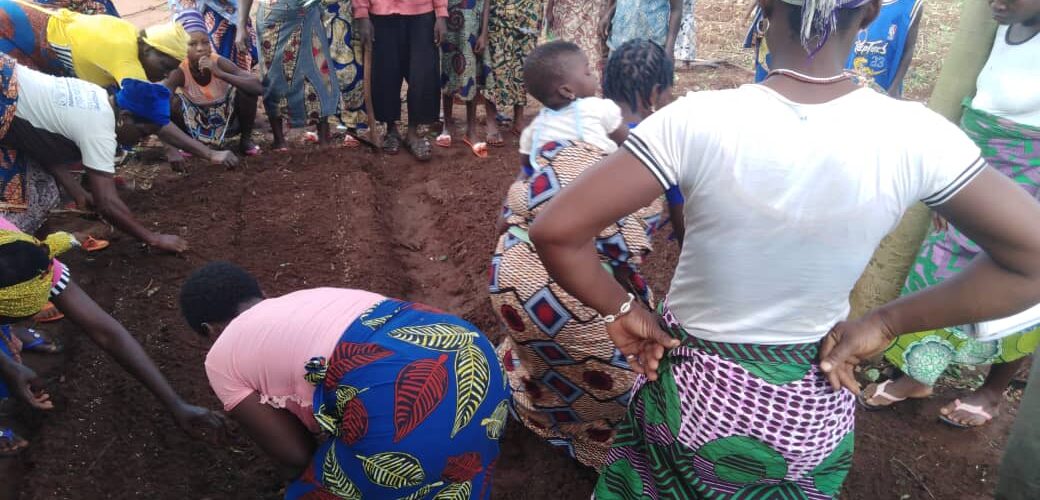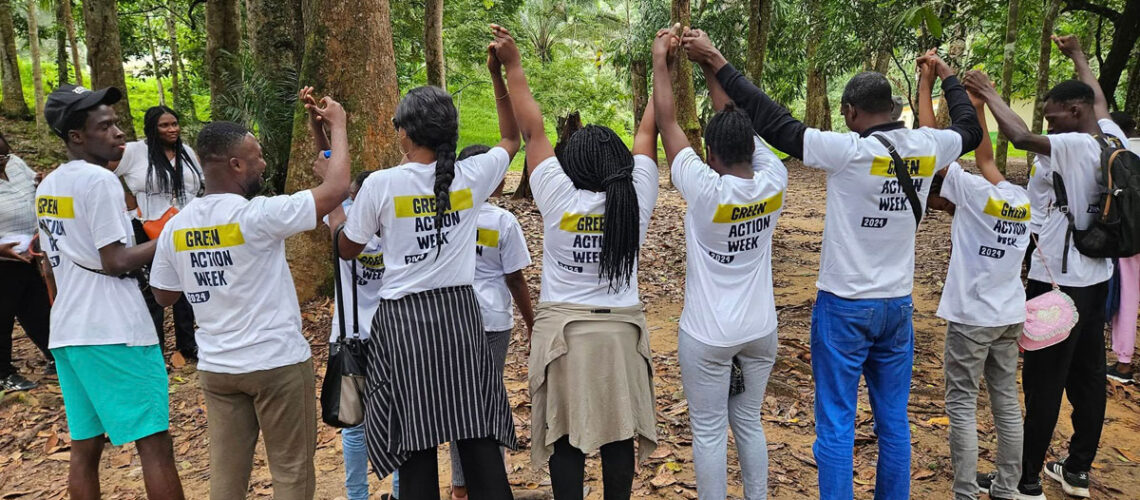Green Action Week:
West Africa
Our West African colleagues focused on filling critical gaps in nutrition, food safety and environmental awareness in Green Action Week 2024. In Benin, campaigns focused on household food security, in Ivory Coast, urban biodiversity was highlighted as a key element of climate regulation, in Niger, cassava consumption was encouraged and in Senegal, the focus was on food safety and hygiene.
Benin Sante et Survie du Consommateur
Malnutrition affects over 1.1 million children in Benin, a crisis that demands urgent attention. This campaign harnessed the power of soilless food cultivation to enhance the nutritional health of vulnerable peri-urban households, with a particular focus on pregnant women and children.
Through a cascading training model, 60 dedicated women across different locations became agents of change, teaching 600 more individuals how to grow nutritious food in soilless containers. A radio broadcast amplified the message, reaching an audience of 2 000 people. Additionally, 30 women and 5 youth were trained to establish tree nurseries, promoting sustainable food sources for the future.
The ripple effect of this campaign has the potential to transform communities, empowering women to provide nourishing food for their families and create lasting change for generations to come.

Benin Sante et Survie du Consommateur
Malnutrition affects over 1.1 million children in Benin, a crisis that demands urgent attention. This campaign harnessed the power of soilless food cultivation to enhance the nutritional health of vulnerable peri-urban households, with a particular focus on pregnant women and children.
Through a cascading training model, 60 dedicated women across different locations became agents of change, teaching 600 more individuals how to grow nutritious food in soilless containers. A radio broadcast amplified the message, reaching an audience of 2 000 people. Additionally, 30 women and 5 youth were trained to establish tree nurseries, promoting sustainable food sources for the future.
The ripple effect of this campaign has the potential to transform communities, empowering women to provide nourishing food for their families and create lasting change for generations to come.
Association pour la Défense de l’Environnement et des Consommateurs (ADEC)
ADEC has been at the forefront of tackling food-borne illnesses by empowering consumers with the knowledge and tools to adopt effective food safety practices. Through raising awareness of hygiene, sustainable farming principles, and responsible consumption, ADEC is transforming the way communities approach food safety.
Building on its previous work promoting micro-gardening in the Dakar and Thiès regions, ADEC organized specialized training for key target groups, expanding its impact. Students at a school in Rufisque and community educational supervisors received valuable training in micro-gardening, equipping them with practical skills for healthier, more sustainable living. Women’s groups were also trained to produce bleach, soaps, and shampoos, fostering local economic empowerment and improving hygiene.
A highlight of the campaign was the promotion of ‘ngourbane,’ a traditional dish known for its high nutritional value. Training in its preparation has allowed local communities to introduce the dish to the market, generating income and creating new livelihood opportunities for households. This initiative is a powerful example of how food safety and nutrition can be harnessed to drive both community wellbeing and economic growth.
Association pour la Défense de l’Environnement et des Consommateurs (ADEC)
ADEC has been at the forefront of tackling food-borne illnesses by empowering consumers with the knowledge and tools to adopt effective food safety practices. Through raising awareness of hygiene, sustainable farming principles, and responsible consumption, ADEC is transforming the way communities approach food safety.
Building on its previous work promoting micro-gardening in the Dakar and Thiès regions, ADEC organized specialized training for key target groups, expanding its impact. Students at a school in Rufisque and community educational supervisors received valuable training in micro-gardening, equipping them with practical skills for healthier, more sustainable living. Women’s groups were also trained to produce bleach, soaps, and shampoos, fostering local economic empowerment and improving hygiene.
A highlight of the campaign was the promotion of ‘ngourbane,’ a traditional dish known for its high nutritional value. Training in its preparation has allowed local communities to introduce the dish to the market, generating income and creating new livelihood opportunities for households. This initiative is a powerful example of how food safety and nutrition can be harnessed to drive both community wellbeing and economic growth.
ADDC-Wadata
In Niger, cassava is a crucial crop for food security and the livelihoods of small-scale producers. While cassava is commonly consumed raw, braised, or as a stew, a significant amount of processed cassava is imported from Nigeria and Benin. Boosting local cassava production could strengthen Niger’s economy, reduce dependency on imports, and enhance nutritional intake.
ADDC-Wadata’s campaign sought to transform cassava from an ornamental garden plant into a vital source of food and income. By promoting cassava cultivation both in home gardens and on farms, the campaign aimed to empower local communities to grow their own food, reducing reliance on external sources.
The campaign included three dynamic radio debates, broadcast in local languages, to share knowledge about cassava planting and processing techniques. Additionally, two planting sites were identified and prepared, inviting community members to actively participate in planting and receiving hands-on training in field maintenance. To foster ongoing support, a dedicated WhatsApp group was created to maintain communication with participants and ensure continuous learning.
Cassava processing equipment was also acquired, and experts were brought in to ensure the successful scaling of local processing efforts. This campaign is a step toward unlocking the full potential of cassava production in Niger, driving economic growth and improving food security.
ADDC-Wadata
In Niger, cassava is a crucial crop for food security and the livelihoods of small-scale producers. While cassava is commonly consumed raw, braised, or as a stew, a significant amount of processed cassava is imported from Nigeria and Benin. Boosting local cassava production could strengthen Niger’s economy, reduce dependency on imports, and enhance nutritional intake.
ADDC-Wadata’s campaign sought to transform cassava from an ornamental garden plant into a vital source of food and income. By promoting cassava cultivation both in home gardens and on farms, the campaign aimed to empower local communities to grow their own food, reducing reliance on external sources.
The campaign included three dynamic radio debates, broadcast in local languages, to share knowledge about cassava planting and processing techniques. Additionally, two planting sites were identified and prepared, inviting community members to actively participate in planting and receiving hands-on training in field maintenance. To foster ongoing support, a dedicated WhatsApp group was created to maintain communication with participants and ensure continuous learning.
Cassava processing equipment was also acquired, and experts were brought in to ensure the successful scaling of local processing efforts. This campaign is a step toward unlocking the full potential of cassava production in Niger, driving economic growth and improving food security.
Association Ivoirienne des Consommateurs
Urban biodiversity plays a critical role in improving air quality, regulating the climate, and creating spaces that promote well-being and recreation. This campaign sought to elevate the importance of urban biodiversity and inspire a collective commitment to environmental protection.
By uniting consumers and key stakeholders, the campaign fostered meaningful discussions about the vital need to preserve urban green spaces. Over 100 shrubs and plants were planted, enhancing local ecosystems and contributing to a greener environment. The initiative also reached students through school visits, where they learned about adopting eco-responsible behaviours, including waste reduction.
A highlight of the campaign was a visit to the Banco Forest, where participants were immersed in the stunning natural beauty and the essential role that forests play in climate regulation. The campaign also hosted a transformative “Envisioning Sustainable Consumption” workshop, where participants were encouraged to create art inspired by sustainability and showcased works from the 2023 global campaign.
With more than 5 000 individuals reached through television and national media coverage, the campaign has sparked widespread interest and support for future citizen mobilization. This momentum paves the way for long-lasting partnerships and impactful environmental projects in the years ahead.
Association Ivoirienne des Consommateurs
Urban biodiversity plays a critical role in improving air quality, regulating the climate, and creating spaces that promote well-being and recreation. This campaign sought to elevate the importance of urban biodiversity and inspire a collective commitment to environmental protection.
By uniting consumers and key stakeholders, the campaign fostered meaningful discussions about the vital need to preserve urban green spaces. Over 100 shrubs and plants were planted, enhancing local ecosystems and contributing to a greener environment. The initiative also reached students through school visits, where they learned about adopting eco-responsible behaviours, including waste reduction.
A highlight of the campaign was a visit to the Banco Forest, where participants were immersed in the stunning natural beauty and the essential role that forests play in climate regulation. The campaign also hosted a transformative “Envisioning Sustainable Consumption” workshop, where participants were encouraged to create art inspired by sustainability and showcased works from the 2023 global campaign.
With more than 5 000 individuals reached through television and national media coverage, the campaign has sparked widespread interest and support for future citizen mobilization. This momentum paves the way for long-lasting partnerships and impactful environmental projects in the years ahead.
